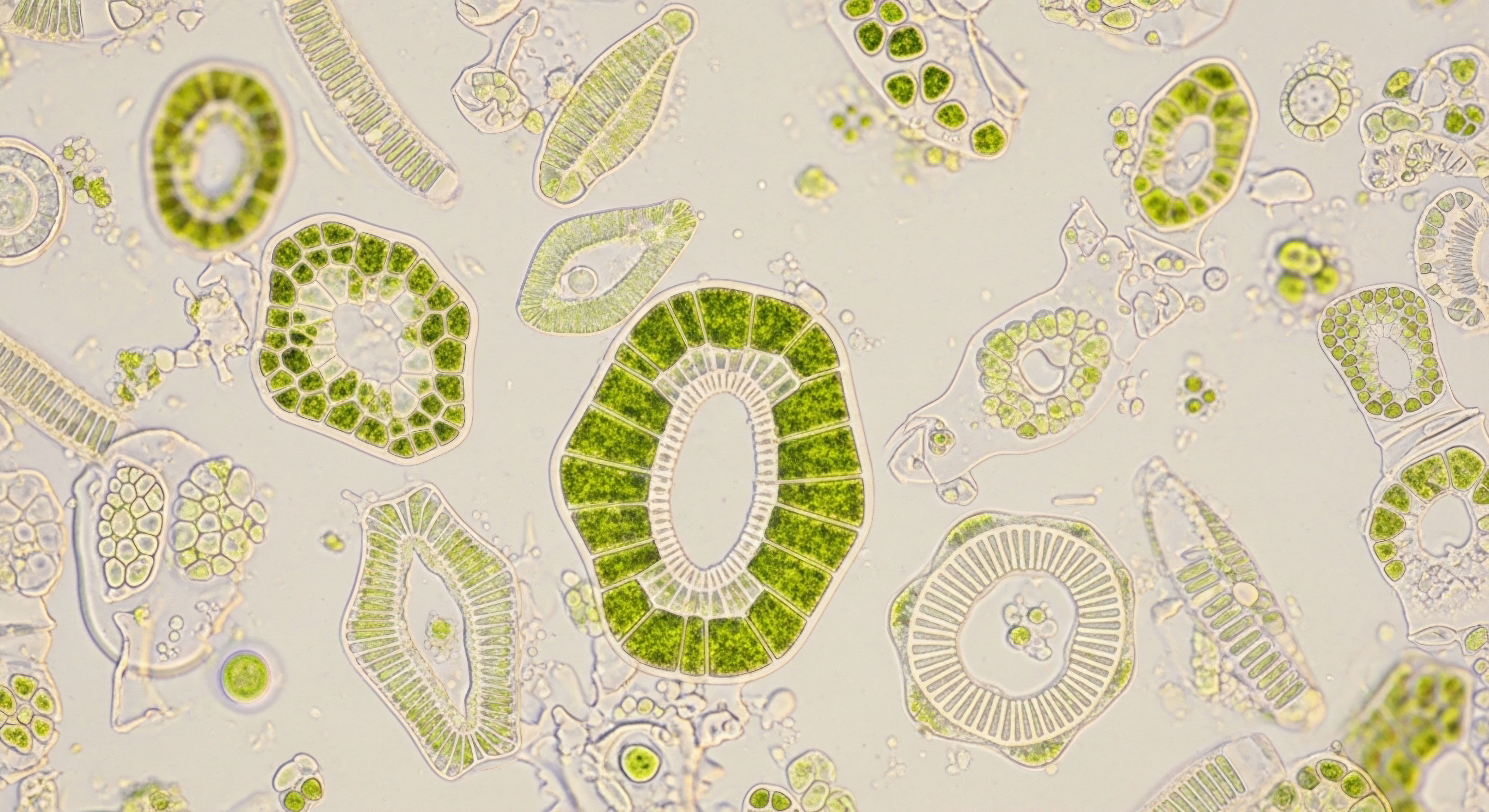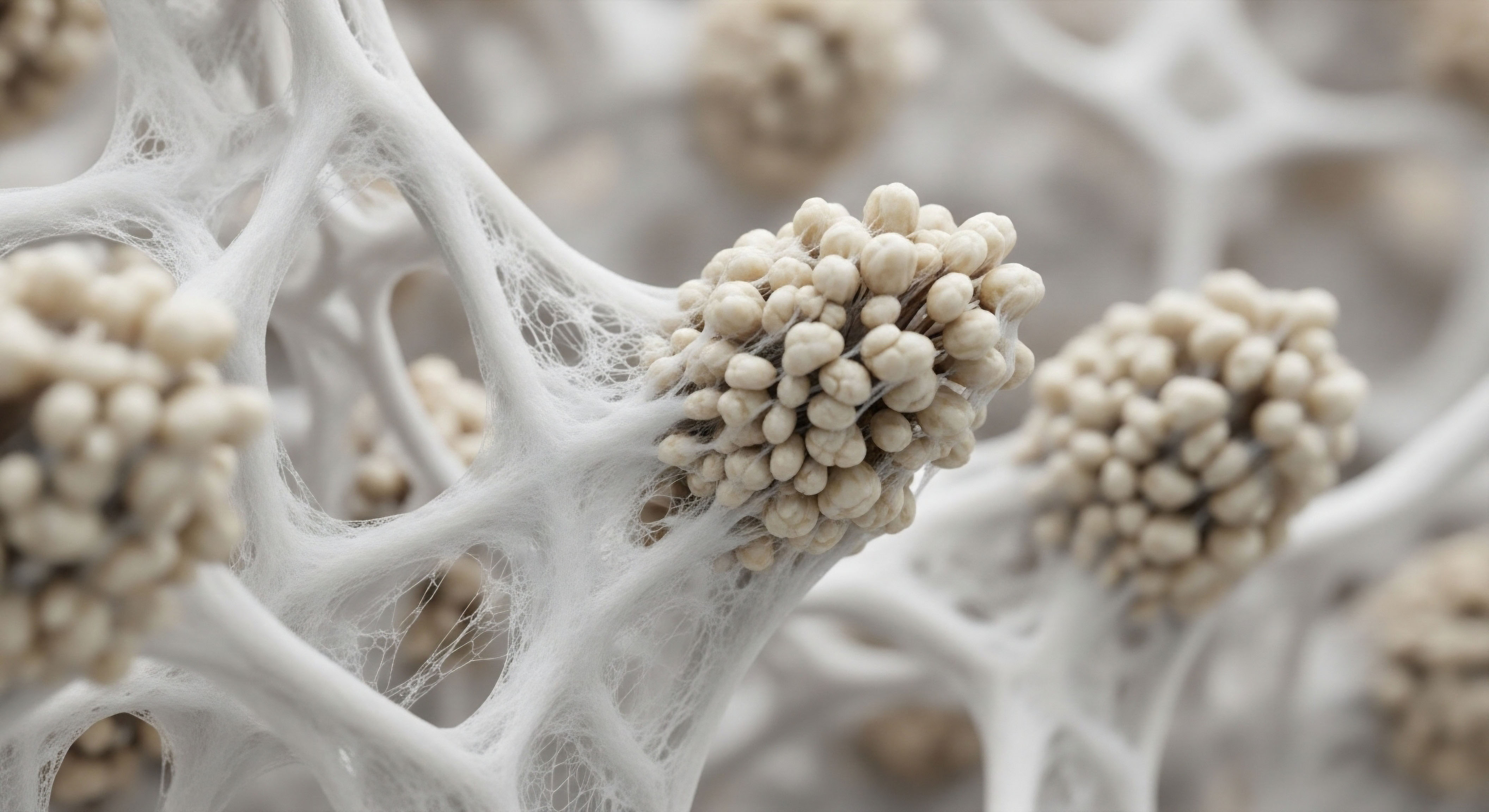

Understanding Your Biological Script
Many individuals experience the profound impact of hormonal shifts, noticing changes in energy, mood, and overall vitality. When considering external support, such as injected hormones or peptides, a deeper question often arises ∞ why do some individuals respond with remarkable ease, while others encounter unforeseen challenges?
This variability is not arbitrary; it speaks to the unique biological script each of us carries, a script intricately woven into our genetic code. Your body’s internal communication network, the endocrine system, orchestrates countless physiological processes. Introducing exogenous hormones initiates a complex dialogue within this system, a conversation profoundly shaped by your individual genetic makeup.
Consider the fundamental architecture of your immune system, the body’s vigilant protector. It continuously monitors internal and external environments, discerning “self” from potential threats. When you introduce an injected hormone, this sophisticated defense mechanism assesses the new compound. The manner in which your immune system perceives and reacts to these substances is not universal; it is a highly personalized interaction.
Genetic variations serve as critical determinants in this recognition process, influencing the very first steps of the immunological response. Understanding this foundational principle allows for a more informed and empowered approach to personalized wellness.
Your genetic blueprint fundamentally shapes how your body interprets and responds to injected hormones, dictating the personalized nature of immunological reactions.

How Do Genes Shape Initial Immune Signals?
The initial reception of an injected hormone involves a symphony of cellular interactions. Specialized immune cells, such as antigen-presenting cells, encounter the foreign substance. Their ability to process and display components of this hormone to other immune cells is largely pre-programmed by specific genetic loci.
These genetic instructions influence the efficiency of antigen presentation, a critical step in initiating an adaptive immune response. Polymorphisms in genes encoding components of these cellular recognition pathways can lead to subtle, yet significant, differences in how vigorously or subtly the immune system responds.
Beyond antigen presentation, your genes also govern the expression and sensitivity of various receptors on immune cells. Hormones, including those administered exogenously, bind to these receptors, initiating intracellular signaling cascades that modulate immune cell activity. Genetic variations in these receptor structures can alter binding affinity or downstream signaling, leading to divergent cellular responses. A thorough appreciation of these genetic underpinnings moves us beyond a generalized understanding of hormonal therapy, towards a precise appreciation of individual biological responses.


Genetic Predispositions and Endocrine-Immune Interplay
Building upon the foundational understanding of genetic influence, we delve into the specific mechanisms by which your inherited traits modulate immunological responses to injected hormones. The body’s endocrine and immune systems maintain a continuous, intricate dialogue, a dynamic interplay where hormones can act as immunomodulators, and immune factors can influence hormonal secretion. Genetic variations introduce distinct dialects into this conversation, shaping how the immune system interprets the presence of exogenous hormones and peptides.
A primary genetic influence stems from the Human Leukocyte Antigen (HLA) complex, a set of genes located on chromosome 6. These genes encode proteins vital for presenting fragments of foreign substances, known as antigens, to T-lymphocytes. When an exogenous hormone or peptide is injected, its molecular structure or associated carrier proteins can be processed and presented by HLA molecules.
Specific HLA alleles, varying significantly between individuals, determine which antigens are presented and with what efficiency. This genetic variability can dictate whether an immune response is robust, muted, or even misdirected, potentially leading to the formation of anti-hormone antibodies or localized inflammatory reactions.

Exploring Polymorphisms in Cytokine Genes
The immune system’s response to any stimulus, including injected substances, involves the release of signaling molecules called cytokines. These proteins orchestrate inflammation, immune cell proliferation, and differentiation. Genetic polymorphisms within the genes encoding various cytokines, such as Interleukin-6 (IL-6), Tumor Necrosis Factor-alpha (TNF-α), and Interleukin-10 (IL-10), can alter their production levels or receptor sensitivity.
For instance, an individual with a genetic predisposition for higher pro-inflammatory cytokine production might experience a more pronounced inflammatory response at the injection site or a systemic inflammatory reaction to a therapeutic peptide. Conversely, variations promoting anti-inflammatory cytokines could lead to a more tolerant immunological profile.
Variations in cytokine genes profoundly influence the inflammatory trajectory following hormone injections, dictating the intensity of the body’s internal reaction.
Consider the targeted hormonal optimization protocols, such as Testosterone Replacement Therapy (TRT) for men and women, or various growth hormone peptide therapies. The active compounds, like Testosterone Cypionate or Sermorelin, are recognized by the body in a context shaped by these genetic factors.
A genetic variant affecting the aromatase enzyme (encoded by the CYP19A1 gene), for example, might alter the rate of testosterone conversion to estrogen, influencing estrogen’s immunomodulatory effects. This intricate web of genetic predispositions means that a standardized dose can elicit a highly individualized immunological outcome, necessitating a personalized approach to therapeutic management.

Genetic Markers Influencing Immunological Responses
- HLA Alleles ∞ Dictate antigen presentation, influencing the recognition of injected hormones as “self” or “non-self.”
- Cytokine Gene Polymorphisms ∞ Alter the balance of pro-inflammatory and anti-inflammatory signaling.
- Hormone Receptor Variants ∞ Affect the sensitivity of immune cells to hormonal signals.
- Enzyme Genes (e.g. CYP19A1) ∞ Influence hormone metabolism and the resulting immunomodulatory metabolite profiles.
Understanding these genetic nuances helps clinicians anticipate potential immunological responses, guiding decisions on hormone selection, dosage adjustments, and co-administration of agents like Anastrozole. For instance, in female hormonal balance protocols, the precise interaction of exogenous testosterone with estrogen pathways, influenced by genetic variations, holds significance for immune function. Similarly, peptide therapies, which introduce specific amino acid sequences, might trigger varying degrees of antibody formation depending on the individual’s HLA profile and immune surveillance mechanisms.
| Genetic Factor | Mechanism of Influence | Clinical Relevance |
|---|---|---|
| HLA Complex Genes | Antigen presentation efficiency and specificity | Risk of antibody formation against peptides, personalized immune tolerance |
| Cytokine Gene Polymorphisms | Modulation of inflammatory response magnitude | Severity of injection site reactions, systemic inflammatory burden |
| Androgen Receptor (AR) CAG Repeats | Receptor sensitivity to testosterone | Differential immune cell response to TRT, variable anti-inflammatory effects |
| Estrogen Receptor (ER) Polymorphisms | Immune cell sensitivity to estrogenic signals | Varied immunomodulatory effects of estrogen metabolites |


Molecular Architectures of Immune Tolerance and Genetic Imprints
The exploration of genetic influences on immunological responses to injected hormones culminates in a deep understanding of molecular architectures governing immune tolerance and the precise imprints of genetic variation. This academic lens reveals the profound complexity inherent in the body’s self-regulation, particularly at the intersection of endocrinology and immunology.
When considering exogenous hormonal interventions, the concept of immune tolerance ∞ the state of unresponsiveness to substances that could potentially evoke an immune reaction ∞ stands as a central tenet. Genetic predispositions critically influence the delicate balance between tolerance and reactivity.
The intricate process of T-cell activation, a cornerstone of adaptive immunity, relies on a dual signaling mechanism. First, the T-cell receptor recognizes an antigen presented by an HLA molecule; second, co-stimulatory signals provide the necessary “go-ahead.” Genetic polymorphisms in genes encoding co-stimulatory molecules (e.g.
CD28, CTLA-4, PD-1) can profoundly alter the threshold for T-cell activation. For instance, variants in CTLA-4, a crucial immune checkpoint inhibitor, might lead to a diminished capacity for immune suppression, potentially increasing the likelihood of an unwanted immune response to an injected hormone or peptide. This level of genetic detail moves beyond general concepts, directly addressing the mechanistic underpinnings of individual immunological variability.

Epigenetic Modulations and Immune Memory
Beyond direct genetic sequence variations, epigenetic modifications represent another layer of genetic influence. These changes, including DNA methylation and histone modifications, alter gene expression without changing the underlying DNA sequence. Hormones themselves can induce epigenetic changes in immune cells, modulating their function and reactivity.
Genetic predispositions might influence an individual’s epigenetic machinery, leading to differential responses to hormonal signals. This creates a dynamic interplay where the genome provides the potential, and epigenetics, influenced by internal and external cues including exogenous hormones, shapes the actual immunological phenotype.
Epigenetic mechanisms, influenced by both genetic background and hormonal signals, play a pivotal role in shaping the adaptive immune landscape.
Furthermore, the formation of immunological memory following exposure to injected peptides, such as Sermorelin or Tesamorelin, also bears a genetic signature. While the goal of these therapies is physiological benefit, the immune system might perceive them as novel antigens.
The efficiency and duration of antibody production, as well as the persistence of memory B and T cells, are influenced by genetic factors governing immune cell longevity and differentiation pathways. Understanding these genetic determinants assists in predicting long-term efficacy and potential for immune-mediated side effects, which might include reduced therapeutic effect due to neutralizing antibodies or rare hypersensitivity reactions.

Interplay of Genetic Factors in Immune Response to Peptides
- Antigen Processing Genes ∞ Variations influence how peptides are broken down and presented.
- Co-stimulatory Molecule Genes ∞ Dictate the activation threshold for T-cells responding to peptide antigens.
- Antibody Gene Diversity ∞ Genetic recombination in B cells creates a vast repertoire of antibodies, but specific germline variations can affect the strength and breadth of antibody responses.
- Toll-like Receptor (TLR) Genes ∞ Polymorphisms can alter innate immune sensing of peptide contaminants or aggregates.
The gut microbiome, an ecosystem of microorganisms residing in the digestive tract, also plays a profound role in modulating systemic immunity. The composition and function of an individual’s microbiome are influenced by both diet and host genetics. Hormones, in turn, can affect microbial balance, and microbial metabolites can influence hormone signaling.
Genetic variations affecting gut barrier integrity or immune responses within the gut can indirectly shape systemic immunological reactions to injected substances. This holistic perspective underscores the interconnectedness of seemingly disparate biological systems, all unified by the underlying genetic code.
| Genetic Locus | Associated Immune Mechanism | Consequence for Injected Hormones |
|---|---|---|
| MHC Class I & II (HLA) | Antigen presentation to CD8+ and CD4+ T cells | Variability in immune recognition, potential for T-cell mediated reactions |
| FOXP3 Gene | Development and function of regulatory T cells (Tregs) | Influence on immune tolerance and suppression of unwanted responses |
| TLR Receptor Genes | Innate immune recognition of molecular patterns | Differential initial inflammatory responses to injection components |
| Cytokine Receptor Genes | Cellular responsiveness to immune signaling molecules | Varied sensitivity to pro- or anti-inflammatory signals post-injection |
| AHR (Aryl Hydrocarbon Receptor) Gene | Immune cell differentiation and environmental sensing | Modulation of immune cell fate, influenced by hormonal and environmental factors |

References
- Klein, J. & Sato, A. (2000). The HLA System ∞ First of Two Parts. New England Journal of Medicine, 343(10), 702-709.
- Cutolo, M. Sulli, A. & Seriolo, B. (2005). Anti-inflammatory effects of testosterone in rheumatoid arthritis. Arthritis & Rheumatism, 52(4), 1012-1017.
- Straub, R. H. (2007). The complex role of estrogens in inflammation. Endocrine Reviews, 28(5), 521-574.
- Picard, C. Puel, A. & Bustamante, J. (2018). The human IL-6/IL-6R signaling pathway ∞ Role in immunity and disease. Journal of Experimental Medicine, 215(6), 1479-1493.
- Giefing, C. & Schwab, R. (2019). Pharmacogenomics in Endocrinology. Current Opinion in Endocrine and Metabolic Research, 7, 20-25.
- O’Connell, R. M. Kahn, D. & Capecchi, M. R. (2012). Genetic mechanisms of immune tolerance. Annual Review of Immunology, 30, 169-195.
- Verma, R. & Singh, K. (2020). Genetic Polymorphisms and Autoimmune Diseases. Journal of Clinical Immunology, 40(6), 843-855.
- Xu, Y. & Li, C. (2021). Epigenetic Regulation in Immune Cell Development and Function. Frontiers in Immunology, 12, 723456.
- Wang, Y. & Wei, X. (2017). The Role of Gut Microbiota in Immune Regulation. Cellular & Molecular Immunology, 14(10), 837-845.
- Kanda, N. & Tamaki, K. (1999). Estrogen enhancement of Fas-mediated apoptosis in activated T cells. Journal of Immunology, 162(5), 2631-2638.

Reclaiming Your Vitality
Your journey toward optimal hormonal health is deeply personal, an unfolding narrative guided by your unique biological landscape. The knowledge that genetic factors profoundly influence your immunological responses to injected hormones provides a powerful lens through which to view your wellness path.
This understanding moves beyond a one-size-fits-all mentality, underscoring the necessity of a truly individualized approach. Consider this exploration a fundamental step in deciphering your body’s intricate language, empowering you to collaborate with clinical guidance that respects your distinct biological signature. The path to reclaiming vitality and function without compromise begins with this profound self-awareness, leading you towards choices that resonate with your authentic biological self.



